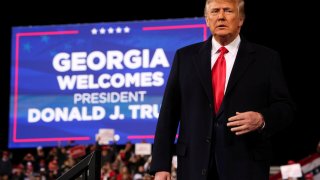
- Portions of a Georgia special grand jury's final report on its investigation into possible election interference by former President Donald Trump and his allies are set to be made public.
- The report's introduction and conclusion, as well as a section detailing jurors' concerns that some witnesses may have lied under oath during their testimony, are set to be released Thursday.
- The full report will include recommendations on whether anyone should face criminal charges related to Georgia's 2020 election.
A judge in Georgia is set to publicly disclose on Thursday portions of a special grand jury's final report on its investigation into possible election interference by former President Donald Trump and his allies.
Fulton County Superior Court Judge Robert McBurney earlier this week ordered the release of the report's introduction and conclusion, as well as a section detailing jurors' concerns that some witnesses may have lied under oath.
Those sections "are ripe for publication" because they don't identify any witnesses, McBurney said in an order Monday. He delayed their release until Thursday in order to give the parties involved time to discuss possible redactions.
The full report will include recommendations on whether anyone should face criminal charges related to the 2020 presidential election in Georgia. But that portion won't be released publicly — at least not yet, McBurney said.
He has directed the office of Fulton County District Attorney Fani Willis to provide periodic updates about the status of its probe so he can reassess if other parts of the final report "can be properly disclosed."
The decision on whether or not to issue indictments falls to Willis, whose investigation is ongoing.
Money Report
The special grand jury was seated last May to investigate possible efforts to disrupt the 2020 elections in Georgia and to recommend whether anyone should be criminally prosecuted.
After sifting through evidence and hearing testimony from dozens of witnesses — including multiple Trump allies, such as Sen. Lindsey Graham, R-S.C. — the grand jury in December submitted its final report, recommending that it be published.
"Having reviewed the final report, the undersigned concludes that the special purpose grand jury did not exceed the scope of its prescribed mission," McBurney wrote in Monday's order. "Indeed it provided the District Attorney's office with exactly what she requested: a roster of who should (or should not) be indicted, and for what, in relation to the conduct (and aftermath) of the 2020 general election in Georgia."
But he decided that disclosure of the entire report "at this time is not proper," citing due process concerns.
Georgia was one of several key swing states that narrowly voted for President Joe Biden, then the Democratic nominee, over Trump in the 2020 presidential election. Trump falsely claimed he won the election and asserted that the outcome had been "rigged" against him, citing a plethora of unfounded conspiracy theories about widespread electoral fraud.
Trump, his allies and his legal team sought to overturn his loss to Biden in the general election by challenging the results in Georgia and other key states.
A flurry of lawsuits filed in late 2020 by Trump's campaign were almost entirely rejected in the courts. In early January 2021, Trump called Georgia Secretary of State Brad Raffensperger, a Republican, and urged him to "find" enough votes in Trump's favor to reverse his loss in the Peach State.
Raffensperger refused, and the state's electoral votes ultimately went to Biden — after a violent mob of Trump's supporters, spurred by his false election claims, had been cleared from the U.S. Capitol.
Trump was impeached in the House on a charge of fomenting the riot, then acquitted in the Senate. In February 2021, Willis opened an investigation into Trump's call to Raffensperger.
This is developing news. Please check back for updates.






